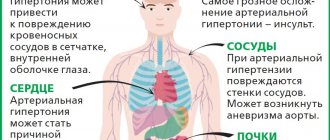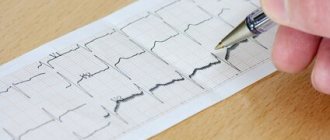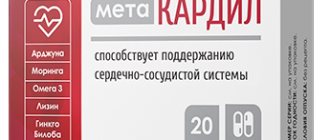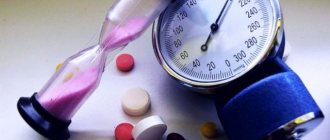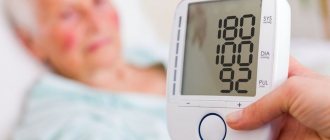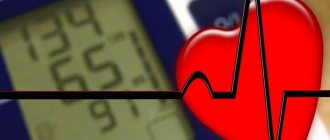19.02.2020
Arterial hypertension or hypertension is a common cardiovascular disease characterized by high blood pressure. Every fifth adult and almost every second elderly person faces a similar diagnosis. Many people think, well, I have high blood pressure, if I have a headache, I’ll take a pill. But the problem is that hypertension is fraught with serious consequences, including heart failure, heart attack or stroke. That is why the disease must be kept under control.
Diagnosis confirmation
It is not difficult to identify hypertension, but the insidiousness of the disease lies in the fact that it can occur without symptoms at all for a long time. Occasionally it causes headaches, for example due to weather changes. People take pain medication and the symptom goes away. But this is not a treatment for hypertension itself.
The diagnosis of “arterial hypertension” is confirmed by pressure readings (BP) measured using a tonometer of 140/90 mmHg or higher. So, if such values are recorded during a medical examination at least 2 times, then this is hypertension. And it requires therapeutic measures.
Hypertension - what worries patients
05.Jul.2021
QUESTION: “Can I suspect hypertension myself?
I often have tinnitus. Is this a sign of high blood pressure? ANSWER:
Hypertension has different symptoms. Among them: uneven gait (a person literally staggers from changes in pressure), headaches (both strong and weak, usually occurring in the morning in the back of the head or temples), tinnitus, dizziness, nausea, nosebleeds, insomnia, redness of the face, “floaters” before the eyes or fog in the eyes... Often, patients are bothered by pain under the shoulder blade, in the chest, in the fingers. But, alas, hypertension does not manifest itself for a very long time. Therefore, it is necessary to regularly monitor your blood pressure levels - purchase a tonometer.
QUESTION: I feel comfortable with high blood pressure.
Conversely, I feel bad when the pressure drops. Is it necessary to treat hypertension in such a situation? ANSWER:
Some patients do not feel pressure surges at all; there are often cases when the body adapts, and at such moments people, on the contrary, feel very well. It is very dangerous. If hypertension is not treated, a person may very soon develop a stroke or coronary heart disease. In addition, high blood pressure increases the risk of premature death. There are such sad figures: in 68 out of 100 cases of myocardial infarction and in 75 out of 100 cases of stroke, patients had an increase in blood pressure, which these people were not sufficiently controlled. If at the initial stage you can fight hypertension with a diet, a correct lifestyle, regularly measuring your blood pressure and preventing it from increasing, then at more serious stages you can no longer do without medications.
QUESTION: What blood pressure is considered normal?
ANSWER
: The biggest debate among doctors and patients is about what pressure is considered normal. So, up to 120/80 is the norm, from 120/80 to 130/80 is high blood pressure, from 130/80 to 139/89 is already first-degree hypertension, which requires drug therapy. But, as hypertensive patients note, at different times of the day and depending on anxiety, after physical activity, drinking alcohol or smoking, these numbers can fluctuate significantly. Therefore, information about how quickly after a jump blood pressure returns to normal is very important for the attending physician. It’s good if it takes no more than 30 minutes to stabilize. Moreover, the less stress or physical activity, the sooner the pressure should return to its original level.
QUESTION: How many times a day do I need to measure my blood pressure before my doctor can make a diagnosis?
ANSWER:
The diagnosis of “hypertension” is made to a patient only based on the results of multiple pressure measurements (at least five times a day - measurements will have to be taken both at night and early in the morning), performed on different days. When blood pressure increases slightly, measurements using a tonometer should be carried out over several months.
QUESTION: I am taking medications for hypertension.
I recently discovered that my husband’s blood pressure is also fluctuating. He started taking my pills, but they don't help. Why? ANSWER:
If you have hypertension, you should never prescribe medications yourself. Very often, people use drugs that were not prescribed to them, but recommended by neighbors, friends, and relatives. Under no circumstances should this be done. Only a doctor can choose the dosage of medications after examination and examination. The doctor prescribes a medicine based not only on the diagnosis, but also takes into account: the patient’s age, the stage of the disease (there are 3 stages of hypertension), the condition of the heart (is there angina pectoris, heart failure, cardiac arrhythmias), does the patient have obesity, diabetes mellitus, bronchospasm and other ailments. Antihypertensive (pressure-lowering) drugs often have a very powerful effect, and the consequences of a sudden and severe decrease in blood pressure can be unpredictable. In addition, the dosage during the entire treatment period can be changed repeatedly, both upward and backward, depending on the patient’s condition. It must be remembered that the full effect of taking the drug often appears only after 1-2 weeks.
QUESTION: I’m not yet 50 years old, I follow a diet, take pills, but my condition is not improving.
The pressure is still high. What's the matter? ANSWER:
In this situation, one can suspect that hypertension is not caused by hereditary causes, bad habits (excess fatty and salty foods, tendency to overeat, sedentary lifestyle, smoking) or older age and poor vascular condition, but is associated with other health problems. Among the ailments that increase blood pressure are various diseases of the kidneys and renal arteries, thyroid disease, problems with the adrenal glands, heart disease, and brain injuries. In this case, the patient will have to undergo various studies. If the underlying disease is not treated, hypertension will not go away - medications that lower blood pressure will not help. An examination is required. It is impossible to make a diagnosis in absentia.
Afterword:
Today, arterial hypertension is diagnosed in every fifth Russian. And after 50 years - every second person. It is impossible to completely get rid of the disease, but it is imperative to control your blood pressure, otherwise there is a high risk of developing deadly ailments such as stroke, heart attack and coronary heart disease... Don’t neglect your health, take five minutes, at least in the morning and evening hours, to measure your blood pressure .
What examinations are also prescribed?
In most cases, hypertension is caused precisely by disorders of the blood vessels and heart. In 5-10% of cases, the root cause may be kidney problems, endocrine changes, stress, neurological factors, or even the use of certain supplements and medications. The doctor needs to determine what caused the disease. For this purpose, diagnostics, as a rule, is not limited to simply measuring pressure. Additionally, the following examinations are carried out:
- electrocardiography and echocardiography;
- Ultrasound of the kidneys and other organs of the urinary system;
- Ultrasound of the thyroid gland; computed tomography of the adrenal glands, skull;
- laboratory tests, including urine and blood tests for hormones.
Additionally, consultation with related doctors, including nephrologist, urologist, endocrinologist, neurologist, etc., is recommended.
It is also important to determine the stage and severity of hypertension and the risk of complications. This may require examinations such as:
- stress tests with blood pressure measurement;
- daily blood pressure monitoring;
- fundus examination;
- blood biochemistry for cholesterol, etc.
Treatment without drugs
Bad habits and some features of modern lifestyle increase the risk of developing hypertension:
- smoking. One cigarette smoked causes an increase in blood pressure for half an hour, also increasing the heart rate. And the constant presence of nicotine in the blood leads to a persistent increase in blood pressure;
- overweight and high blood cholesterol;
- low level of physical activity;
- increased blood glucose levels can be caused by excessive consumption of sweets, fast food, etc.
If you normalize your lifestyle and diet, lose weight, and give up harmful habits, then your blood pressure can return to normal.
Drug treatment
If the measures described above do not help, then doctors recommend taking antihypertensive medications. They are selected exclusively by the attending physician, taking into account various individual factors. Taking medications is not one-time or even a course, but permanent. Therefore, it is important that specific drugs are not only effective (this requires constant monitoring of blood pressure), but also do not lose their effect over time and do not cause adverse reactions.
But often patients do not resort to treatment immediately, but only after a hypertensive crisis, pre-infarction condition or other life-threatening complications of hypertension. It’s better to do differently and engage in prevention.
Guskov Bogdan Valerievich
Cardiologist, Therapist
- On Lukyanovskaya, st. Kudryavskaya, 31/33
Cost of admission: 450 UAH.
Make an appointment
Management of patients in inpatient and outpatient settings of the following profiles: cardiological, therapeutic, pulmonological and patients who require resuscitation and intensive care.
Other articles by the author
Heartache. Angina pectoris. What to do and how to avoid risks to life? What the intensive care door is silent about About the maternity hospital, vaccines and evolution What cardiologists do and should do
Contact us or ask a question
Call now
093 810 90 90Make an appointment
Ask a Question
Write
Comments
familyhealth27.03.2020
To understand what causes pressure in a person, it is necessary to consider the illness itself. There are two types of hypertension: hypertensive disease and symptomatic arterial hypertension. The first type is a chronic process, the causes of advanced AT in any case cannot be explained by doctors and doctors. If there is symptomatic hypertension, then doctors indicate that the cause of hypertension in a person can be one of the following: unbalanced food, stress, poor lifestyle, loose teeth, overweight.
leave a comment
Symptoms of hypertension
Arterial hypertension is an insidious disease, as it has not only dangerous complications, but also a hidden course. Its first manifestations do not cause concern in patients, as they are attributed to overwork or a cold.
If you experience frequent headaches, feelings of nausea, fatigue for no reason, or spots in your eyes, it is important to start regularly measuring your blood pressure. All these are symptoms of first degree hypertension.
Consistently elevated readings are a reason to immediately consult a doctor.
Additionally, the person complains about:
- Increased sweating.
- Swelling of the hands and morning swelling.
- Memory impairment.
- Redness and puffiness of the face.
With first-degree hypertension, the pressure is in the range of 140/90-159/99 mmHg. Art. If you start treatment on time and maintain a healthy lifestyle, then absolute recovery is possible.
If you ignore the symptoms, the disease will progress. Arterial hypertension of the second degree is characterized by high blood pressure: 160/100-179/109 mm Hg. Art. Hypertensive patients also experience:
- Excruciating pain in the head.
- Dizziness.
- Painful sensations in the heart.
Human organs begin to experience discomfort, the likelihood of stroke and vision loss increases. Treatment is carried out only with special medications.
With the third degree of hypertension, the pressure reaches 180/110. The vessels are subjected to extreme stress, and life is threatened due to irreversible changes in the heart. Dangerous pathologies develop:
- Heart failure.
- Angina pectoris.
- Myocardial infarction.
- Arrhythmia.
A typical sign of the disease is hypertensive crises. They are exacerbations of the course of the disease in the form of a sharp increase in pressure, duration - from 1-2 hours to three days, there may also be a severe headache, nausea and vomiting, and dizziness.
